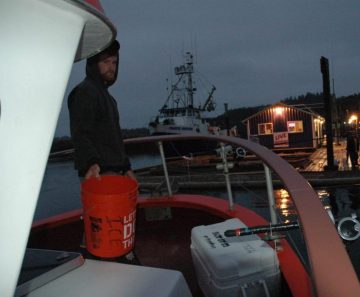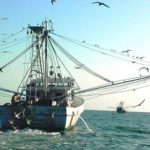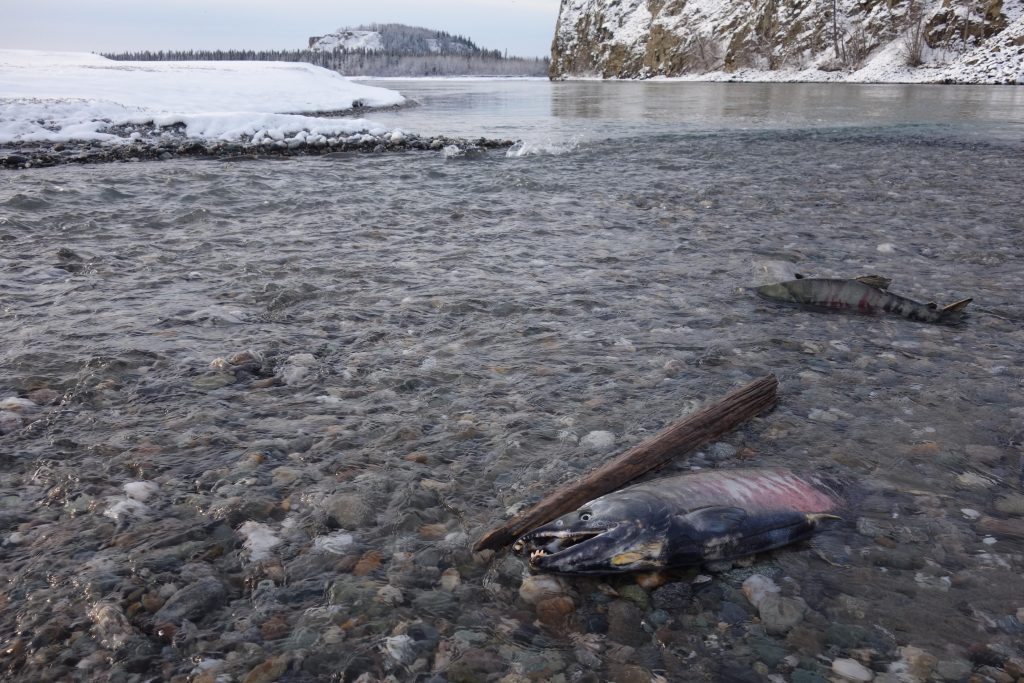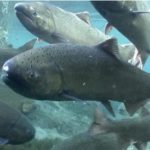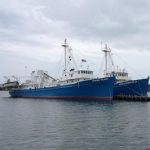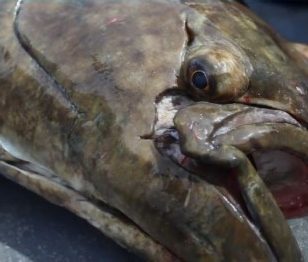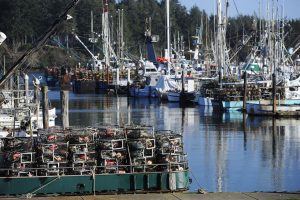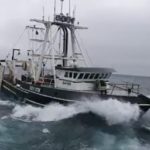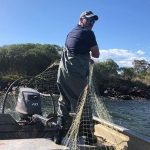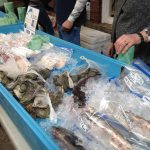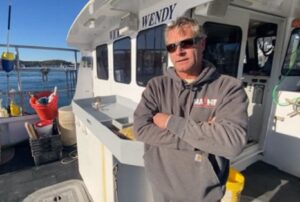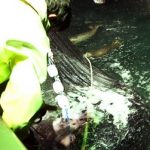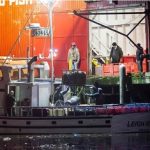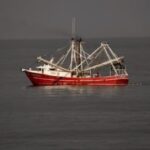Tag Archives: Pacific Fishery Management Council
D.B. Pleschner: Nearshore anchovy abundance not proof fishery is collapsing
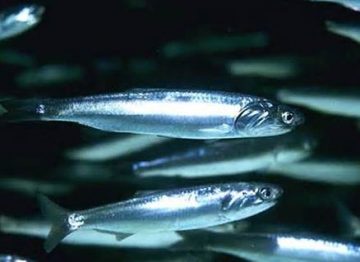 Recently, Dr. William Sydeman of the Farallon Institute, published a study claiming that the abundance of anchovy near shore — especially in places like Monterey — is evidence that the population is collapsing. Sydeman’s logic is based on an old argument that collapsed populations always shrink inshore. But there’s one big problem with that theory — it’s unsupported by scientific evidence.,,, The bottom line: environmental groups with an anti-fishing agenda are already gearing up to hot-box the Pacific Fishery Management Council in spring 2018, lobbying for a steep reduction in anchovy harvest limits, employing whatever colorful, sensational pictures they can paint. click here to read the story 20:58
Recently, Dr. William Sydeman of the Farallon Institute, published a study claiming that the abundance of anchovy near shore — especially in places like Monterey — is evidence that the population is collapsing. Sydeman’s logic is based on an old argument that collapsed populations always shrink inshore. But there’s one big problem with that theory — it’s unsupported by scientific evidence.,,, The bottom line: environmental groups with an anti-fishing agenda are already gearing up to hot-box the Pacific Fishery Management Council in spring 2018, lobbying for a steep reduction in anchovy harvest limits, employing whatever colorful, sensational pictures they can paint. click here to read the story 20:58
Oregon, California senators step up pressure on Trump administration to approve salmon emergency cash
 Oregon and California’s four senators, all Democrats, stepped up the pressure on the Trump administration Wednesday to approve disaster assistance for salmon fishermen along 200 miles of coastline. In April, the Pacific Fishery Management Council, which manages coastal salmon seasons, recommended closing coastal and commercial salmon fishing entirely along an area equal to roughly half of Oregon’s coastline. Govs. Kate Brown of Oregon and Jerry Brown of California requested emergency funding relief in May, to no avail. click here to read the story 11:51
Oregon and California’s four senators, all Democrats, stepped up the pressure on the Trump administration Wednesday to approve disaster assistance for salmon fishermen along 200 miles of coastline. In April, the Pacific Fishery Management Council, which manages coastal salmon seasons, recommended closing coastal and commercial salmon fishing entirely along an area equal to roughly half of Oregon’s coastline. Govs. Kate Brown of Oregon and Jerry Brown of California requested emergency funding relief in May, to no avail. click here to read the story 11:51
Lawsuit seeks to protect whales, turtles from California gillnets
 Oceana filed a lawsuit seeking to force U.S. fisheries managers to implement plans for restricting the number of whales and turtles permitted to be inadvertently snared in drift gillnets used for catching swordfish off California’s coast. The proposed rule, endorsed in 2015 by the Pacific Fishery Management Council, would place numerical limits on “bycatch” of whales and other marine creatures, and suspend swordfish gillnet operations if any of the caps are exceeded. The regulation was expected to gain final approval from the National Marine Fisheries Service. But it was withdrawn last month after the Commerce Department agency determined the cost to the commercial fishing industry outweighed conservation benefits, agency spokesman Michael Milstein said on Thursday. click here to read the story 17:11 Geoff Shester, a senior scientist at Oceana, who was “furious” when he found out the National Oceanic and Atmospheric Administration (NOAA) had decided to against adopting the rule. (lmao!) click here to read 17:13
Oceana filed a lawsuit seeking to force U.S. fisheries managers to implement plans for restricting the number of whales and turtles permitted to be inadvertently snared in drift gillnets used for catching swordfish off California’s coast. The proposed rule, endorsed in 2015 by the Pacific Fishery Management Council, would place numerical limits on “bycatch” of whales and other marine creatures, and suspend swordfish gillnet operations if any of the caps are exceeded. The regulation was expected to gain final approval from the National Marine Fisheries Service. But it was withdrawn last month after the Commerce Department agency determined the cost to the commercial fishing industry outweighed conservation benefits, agency spokesman Michael Milstein said on Thursday. click here to read the story 17:11 Geoff Shester, a senior scientist at Oceana, who was “furious” when he found out the National Oceanic and Atmospheric Administration (NOAA) had decided to against adopting the rule. (lmao!) click here to read 17:13
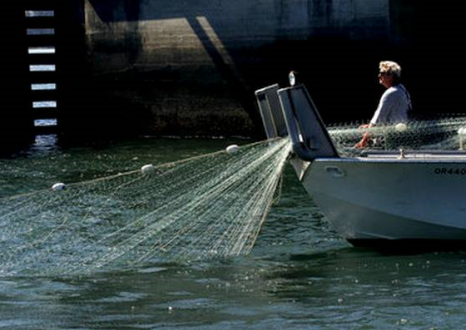
US cancels new protection for endangered West Coast whales
The Trump administration on Monday threw out a new rule intended to limit the numbers of endangered whales and sea turtles getting caught in fishing nets off the West Coast, even though the fishing industry had proposed the measure. The National Marine Fisheries Service said it decided the new protection was not warranted. The action is one of the first by the Trump administration targeting protections for threatened species off the Pacific coast, said Catherine Kilduff, an attorney for the Center for Biological Diversity conservation group. The regulation was designed to reduce the numbers of humpback whales, leatherback sea turtles and other large creatures that accidentally become tangled in mile-long nets set adrift by commercial fishermen overnight to catch swordfish off California and Oregon. click here to read the article (read between the lines, folks) 18:00
Pacific Fishery Management Council meeting in Spokane, Washington June 7‐14, 2017
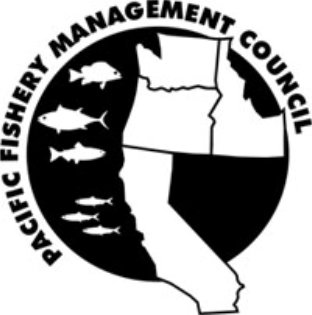 The Pacific Fishery Management Council (Council) and its advisory bodies will meet June 7‐14, 2017 in Spokane, Washington to address issues related to groundfish, coastal pelagic species (CPS), highly migratory species (HMS), Pacific halibut, and habitat matters. For agenda item topics, please click to see the June 7-14, 2017 Meeting Notice WITH Detailed Agenda The Council meeting will be live‐streamed. Click here to Listen to the Live Audio Stream. Enter the Webinar ID The April 2017Â Webinar ID is: 897-986-459 Please enter your email address (required) The meeting will be broadcast live starting at approximately 9 am Pacific Time on Friday, June 9, 2017 For more info, click here 18:32
The Pacific Fishery Management Council (Council) and its advisory bodies will meet June 7‐14, 2017 in Spokane, Washington to address issues related to groundfish, coastal pelagic species (CPS), highly migratory species (HMS), Pacific halibut, and habitat matters. For agenda item topics, please click to see the June 7-14, 2017 Meeting Notice WITH Detailed Agenda The Council meeting will be live‐streamed. Click here to Listen to the Live Audio Stream. Enter the Webinar ID The April 2017Â Webinar ID is: 897-986-459 Please enter your email address (required) The meeting will be broadcast live starting at approximately 9 am Pacific Time on Friday, June 9, 2017 For more info, click here 18:32
Good Lord. Pacific Fishery Management Council Closes 200 Miles Of West Coast To Salmon Fishing
 About 200 miles of the West Coast will be closed to ocean salmon fishing this year to protect a record-low run of Klamath River chinook. Fishery managers with the Pacific Fishery Management Council voted Tuesday for a total closure of ocean salmon seasons from southern Oregon to northern California. Commercial troll fishing seasons will be closed from Florence, Oregon, to Horse Mountain, which is south of Eureka, California. Sport fishing seasons will be closed from Humbug Mountain south of Port Orford, Oregon, to Horse Mountain in northern California. The rest of the coast will have limited fishing seasons. West Coast salmon runs have been hit hard in recent years by drought conditions in their native rivers and El Niño conditions in the Pacific Ocean that reduce their food sources. While fishermen up and down the coast are in for a tough year, those who depend on Klamath River salmon are already calling for help. Fishing groups and Native American tribes plan to ask California Gov. Jerry Brown to declare a fishing disaster so they can receive federal assistance. click here to read the story 18:03
About 200 miles of the West Coast will be closed to ocean salmon fishing this year to protect a record-low run of Klamath River chinook. Fishery managers with the Pacific Fishery Management Council voted Tuesday for a total closure of ocean salmon seasons from southern Oregon to northern California. Commercial troll fishing seasons will be closed from Florence, Oregon, to Horse Mountain, which is south of Eureka, California. Sport fishing seasons will be closed from Humbug Mountain south of Port Orford, Oregon, to Horse Mountain in northern California. The rest of the coast will have limited fishing seasons. West Coast salmon runs have been hit hard in recent years by drought conditions in their native rivers and El Niño conditions in the Pacific Ocean that reduce their food sources. While fishermen up and down the coast are in for a tough year, those who depend on Klamath River salmon are already calling for help. Fishing groups and Native American tribes plan to ask California Gov. Jerry Brown to declare a fishing disaster so they can receive federal assistance. click here to read the story 18:03
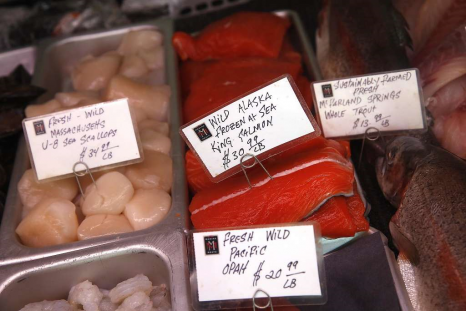
California likely to shorten chinook salmon season
With chinook salmon at its lowest population in years, West Coast fishery managers are considering a proposal to strictly limit the commercial season and to delay its start around the San Francisco Bay from its usual May date to August. A final decision will be made on Tuesday. “You’re probably going to find it only in your upscale grocery stores and upscale restaurants, and it’s not going to be always available. It’s probably not going to be cheap,” said Dave Bitts, a Eureka fisherman and adviser to the Pacific Fishery Management Council, which manages fisheries in the federal waters off California, Oregon and Washington. Click here to read the story 08:55
Pacific sardine fishery closed for the third year in a row
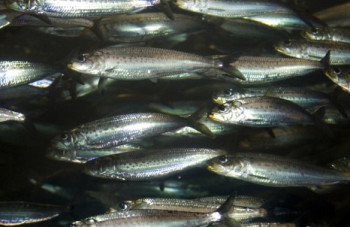 The Pacific Fishery Management Council on April 10 announced the continued closure of the Pacific sardine directed fishery through June 30, 2018. This is the third annual closure in a row for this fishery. Council members heard from scientists that the abundance forecast for the 2017-18 season, scheduled to start July 1, was significantly below the 150,000 metric ton threshold for a directed fishery. They also considered testimony from fishery participants and environmental groups before reaching a decision to close the directed fishery. click here to read the story 19:33
The Pacific Fishery Management Council on April 10 announced the continued closure of the Pacific sardine directed fishery through June 30, 2018. This is the third annual closure in a row for this fishery. Council members heard from scientists that the abundance forecast for the 2017-18 season, scheduled to start July 1, was significantly below the 150,000 metric ton threshold for a directed fishery. They also considered testimony from fishery participants and environmental groups before reaching a decision to close the directed fishery. click here to read the story 19:33
D.B. Pleschner: Study: No correlation between forage fish, predator populations
 On April 9-10, the Pacific Fishery Management Council is meeting in Sacramento to deliberate on anchovy management and decide on 2017 harvest limits for sardine, two prominent west coast forage fish. Extreme environmental groups like Oceana and Pew have plastered social media with allegations that the anchovy population has crashed, sardines are being overfished and fisheries should be curtailed, despite ample evidence to the contrary. Beyond multiple lines of recent evidence that both sardines and anchovy populations are increasing in the ocean, a new study published this week in the journal Fisheries Research finds that the abundance of these and other forage fish species is driven primarily by environmental cycles with little impact from fishing, and well-managed fisheries have a negligible impact on predators — such as larger fish, sea lions and seabirds. This finding flies directly in the face of previous assumptions prominent in a 2012 study commissioned by the Lenfest Ocean Program, funded by the Pew Charitable Trusts, heirs of Sun Oil Company. The Lenfest study concluded that forage fish are twice as valuable when left in the water to be eaten by predators and recommended slashing forage fishery catch rates by 50 to 80 percent. click here to continue reading the article 20:39
On April 9-10, the Pacific Fishery Management Council is meeting in Sacramento to deliberate on anchovy management and decide on 2017 harvest limits for sardine, two prominent west coast forage fish. Extreme environmental groups like Oceana and Pew have plastered social media with allegations that the anchovy population has crashed, sardines are being overfished and fisheries should be curtailed, despite ample evidence to the contrary. Beyond multiple lines of recent evidence that both sardines and anchovy populations are increasing in the ocean, a new study published this week in the journal Fisheries Research finds that the abundance of these and other forage fish species is driven primarily by environmental cycles with little impact from fishing, and well-managed fisheries have a negligible impact on predators — such as larger fish, sea lions and seabirds. This finding flies directly in the face of previous assumptions prominent in a 2012 study commissioned by the Lenfest Ocean Program, funded by the Pew Charitable Trusts, heirs of Sun Oil Company. The Lenfest study concluded that forage fish are twice as valuable when left in the water to be eaten by predators and recommended slashing forage fishery catch rates by 50 to 80 percent. click here to continue reading the article 20:39
Pacific Fishery Management Council meeting in Sacramento April 6-11, 2017
 The Pacific Fishery Management Council and its advisory bodies will meet April 6-11, 2017 in Sacramento, Ca. at the DoubleTree by Hilton Sacramento to address issues related to salmon, groundfish, coastal pelagic species, Pacific halibut, and habitat matters. For agenda item topics, please click to see the April 2017 meeting notice with a detailed agenda. The Council meeting will be live‐streamed. Click here to Listen to the Live Audio Stream For more details, click here 19:58
The Pacific Fishery Management Council and its advisory bodies will meet April 6-11, 2017 in Sacramento, Ca. at the DoubleTree by Hilton Sacramento to address issues related to salmon, groundfish, coastal pelagic species, Pacific halibut, and habitat matters. For agenda item topics, please click to see the April 2017 meeting notice with a detailed agenda. The Council meeting will be live‐streamed. Click here to Listen to the Live Audio Stream For more details, click here 19:58
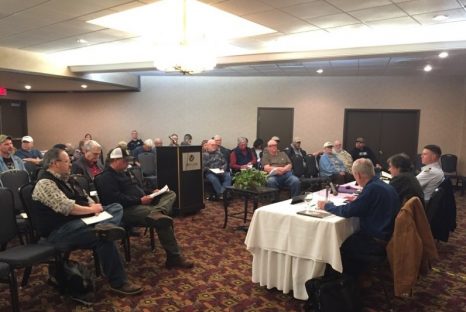
Commercial fishermen on south coast fear salmon season could be cut short
Commercial fishermen on the south coast say they’re worried this year’s fishing season could be cut short or even become obsolete. According to the Pacific Fishery Management Council, salmon numbers are down the past couple of years and this year doesn’t look to be much better. “If the fish don’t show, our season–salmon season–would be over and a lot of guys will make very little money,” said one fisherman of 42 years at a public meeting Monday night. “A lot of markets, restaurants won’t have salmon.” The PFMC took public comment Monday in Coos Bay on proposals for the season and talked about the effect on the salmon fishery. Click here to watch video, read the rest here 17:50
The Pacific Fishery Management Council meeting in Vancouver, Washington. March 7-13, 2017
 The Pacific Fishery Management Council (Council) and its advisory bodies will meet March 7-13, 2017 in Vancouver, Washington. Advisory bodies will start Tuesday, March 7. The Council session will start on Wednesday, March 8 to address issues related to salmon, groundfish, highly migratory species, ecosystem, Pacific halibut, and habitat matters. For agenda item topics, please see the March 2017 meeting agenda. The March 2017 Council meeting will be live‐streamed. Click http://www.gotomeeting.com/online/webinar/join-webinar Enter the Webinar ID – The March 8-13, 2017 Webinar ID is: 897-986-459 Please enter your email address (required) Click here for details 20:43
The Pacific Fishery Management Council (Council) and its advisory bodies will meet March 7-13, 2017 in Vancouver, Washington. Advisory bodies will start Tuesday, March 7. The Council session will start on Wednesday, March 8 to address issues related to salmon, groundfish, highly migratory species, ecosystem, Pacific halibut, and habitat matters. For agenda item topics, please see the March 2017 meeting agenda. The March 2017 Council meeting will be live‐streamed. Click http://www.gotomeeting.com/online/webinar/join-webinar Enter the Webinar ID – The March 8-13, 2017 Webinar ID is: 897-986-459 Please enter your email address (required) Click here for details 20:43
Ocean conditions appear improving for salmon
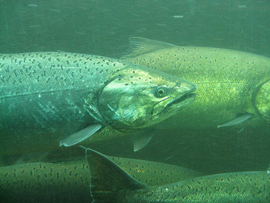 Warm water temperatures in the north Pacific Ocean are starting to cool after three years, but their effect on Northwest salmon will persist for another year or two. “Strange times, but things are looking up, that’s the message,’’ said Marisa Litz of the Washington Department of Fish and Wildlife. Litz made her comments on Tuesday at the agency’s annual unveiling of Columbia River, coastal and Puget Sound salmon forecasts. She recently completed her doctorate from Oregon State University in Fisheries Science, focusing on how variable ocean conditions affect growth and survival of young salmon in the Northwest. Tuesday’s meeting began a six-week process that concludes with the Pacific Fishery Management Council adopting ocean salmon fishing seasons in mid-April. continue reading the story here 11:31
Warm water temperatures in the north Pacific Ocean are starting to cool after three years, but their effect on Northwest salmon will persist for another year or two. “Strange times, but things are looking up, that’s the message,’’ said Marisa Litz of the Washington Department of Fish and Wildlife. Litz made her comments on Tuesday at the agency’s annual unveiling of Columbia River, coastal and Puget Sound salmon forecasts. She recently completed her doctorate from Oregon State University in Fisheries Science, focusing on how variable ocean conditions affect growth and survival of young salmon in the Northwest. Tuesday’s meeting began a six-week process that concludes with the Pacific Fishery Management Council adopting ocean salmon fishing seasons in mid-April. continue reading the story here 11:31
D.B. Pleschner: ENGO Extremists manufacture anchovy ‘crisis’ where none exists
 When the National Marine Fisheries Service (NMFS) recently reapproved the 2017 annual catch limit for the central stock of anchovy at 25,000 metric tons (mt), environmental extremists immediately cried foul. Press releases with doomsday headlines claimed that the anchovy catch limit is now higher than the total population of fish in the sea. Environmentalists claim the anchovy resource has “collapsed” and the current catch limit is dangerously high. But is the anchovy population really decimated, or are these alarmists simply manufacturing another anti-fishing crisis? In reality, anchovies are now amazingly abundant from San Diego to Northern California. Scientific data as well as fishermen’s observation bear this out: Read the op-ed here 12:22
When the National Marine Fisheries Service (NMFS) recently reapproved the 2017 annual catch limit for the central stock of anchovy at 25,000 metric tons (mt), environmental extremists immediately cried foul. Press releases with doomsday headlines claimed that the anchovy catch limit is now higher than the total population of fish in the sea. Environmentalists claim the anchovy resource has “collapsed” and the current catch limit is dangerously high. But is the anchovy population really decimated, or are these alarmists simply manufacturing another anti-fishing crisis? In reality, anchovies are now amazingly abundant from San Diego to Northern California. Scientific data as well as fishermen’s observation bear this out: Read the op-ed here 12:22
Pacific Fishery Management Council Meeting in Garden Grove, California November 15 – 21
The Pacific Fishery Management Council (Council) and its advisory bodies will meet starting Sunday, November 13, 2016 in Garden Grove, California. Advisory bodies will start Sunday, November 13. The Council session will start on Wednesday, November 16, 2016 to address issues related to salmon, groundfish, highly migratory species, coastal pelagic species, Pacific halibut, and habitat matters. Click here to read the Agenda. Click here to listen to the Live Audio Stream 19:37
Pacific Council on proposed Marine Monument
Today, the 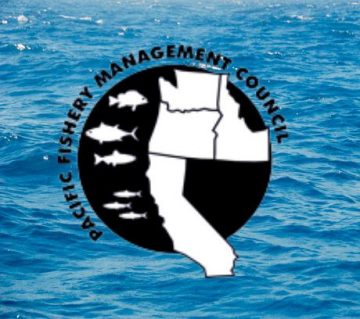 Pacific Fishery Management Council sent a letter to President Obama expressing concern about “how these National Monument designations would impact our fishery management efforts in the west coast Exclusive Economic Zone.” In it, the Council stresses: 1. All of the areas proposed for designation already have significant protections from specific fishing activities. For example – Essential Fish Habitat requirements under the Magnuson-Stevens Fishery Conservation and Management Act; and Cowcod Conservation Areas off the Southern California coast. 2. Fishery management decisions are best done in a thoroughly transparent public process rather than being done with limited involvement of certain stakeholders. 3. The social and economic importance of those areas cannot be understated. Read the letter from the PFMC, and the letter from the Council Coordination Committee by clicking here 07:44
Pacific Fishery Management Council sent a letter to President Obama expressing concern about “how these National Monument designations would impact our fishery management efforts in the west coast Exclusive Economic Zone.” In it, the Council stresses: 1. All of the areas proposed for designation already have significant protections from specific fishing activities. For example – Essential Fish Habitat requirements under the Magnuson-Stevens Fishery Conservation and Management Act; and Cowcod Conservation Areas off the Southern California coast. 2. Fishery management decisions are best done in a thoroughly transparent public process rather than being done with limited involvement of certain stakeholders. 3. The social and economic importance of those areas cannot be understated. Read the letter from the PFMC, and the letter from the Council Coordination Committee by clicking here 07:44
Pacific Fishery Management Council Meeting in Tacoma, Washington June 21-28, 2016 Listen Live
 The Pacific Fishery Management Council and its advisory bodies will meet June 21‐28, 2016 in Tacoma, Washington at Hotel Murano, 1320 Broadway Plaza, Tacoma, WA 98402. Download the June 2015 Meeting Notice WITH Agenda (includes full logistics for public comment deadlines). Listen to the Live Audio Stream Enter the Webinar ID – The June 23-28, 2016 Webinar ID is: 157-423-659 Please enter your email address (required) http://www.pcouncil.org/ 17:56
The Pacific Fishery Management Council and its advisory bodies will meet June 21‐28, 2016 in Tacoma, Washington at Hotel Murano, 1320 Broadway Plaza, Tacoma, WA 98402. Download the June 2015 Meeting Notice WITH Agenda (includes full logistics for public comment deadlines). Listen to the Live Audio Stream Enter the Webinar ID – The June 23-28, 2016 Webinar ID is: 157-423-659 Please enter your email address (required) http://www.pcouncil.org/ 17:56
D.B. Pleschner: Pacific Sardines are not collapsing, may be in recovery
 On April 10, the Pacific Fishery Management Council closed the West Coast sardine fishery for a second straight year. The council followed its ultra-conservative harvest control policy and relied on a stock assessment that does not account for recent sardine recruitment. But in fact, there are multiple lines of evidence that young sardines are now abundant in the ocean. In addition to field surveys, fishermen in both California and the Pacific Northwest have been observing sardines – both small and large — since the summer of 2015. And California fishermen also provided samples of the small fish to federal and state fishery managers. Read the rest here 19:29
On April 10, the Pacific Fishery Management Council closed the West Coast sardine fishery for a second straight year. The council followed its ultra-conservative harvest control policy and relied on a stock assessment that does not account for recent sardine recruitment. But in fact, there are multiple lines of evidence that young sardines are now abundant in the ocean. In addition to field surveys, fishermen in both California and the Pacific Northwest have been observing sardines – both small and large — since the summer of 2015. And California fishermen also provided samples of the small fish to federal and state fishery managers. Read the rest here 19:29
As Pacific sardine collapse worsens, scientists worry about possible ripple in the ecosystem
 Nearly a year into a West Coast sardine fishing ban enacted to protect the collapsing population, the fish formerly worth more than $8 million to Oregon’s economy have shown no signs of a comeback. New federal research indicates numbers of the small, silvery, schooling fish have plummeted further than before the fishing moratorium, dashing any hope of lifting it in 2016. With the current sardine population hovering at 7 percent of its 2007 peak, fishermen now say they expect to wait a decade or more to revive the fishery. “I don’t want to take a pessimistic view, but I would think we’ll be shut down until 2030,” said Ryan Kapp, a Bellingham, Washington, fisherman who advises the Pacific Fishery Management Council on sardines and other fish. Read the article here 15:33
Nearly a year into a West Coast sardine fishing ban enacted to protect the collapsing population, the fish formerly worth more than $8 million to Oregon’s economy have shown no signs of a comeback. New federal research indicates numbers of the small, silvery, schooling fish have plummeted further than before the fishing moratorium, dashing any hope of lifting it in 2016. With the current sardine population hovering at 7 percent of its 2007 peak, fishermen now say they expect to wait a decade or more to revive the fishery. “I don’t want to take a pessimistic view, but I would think we’ll be shut down until 2030,” said Ryan Kapp, a Bellingham, Washington, fisherman who advises the Pacific Fishery Management Council on sardines and other fish. Read the article here 15:33
Ocean salmon seasons set by PFMC, pending NMFS final approval
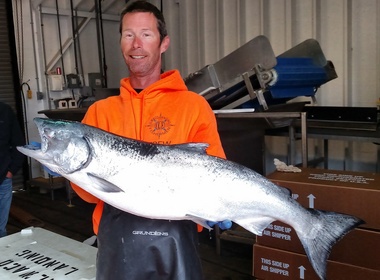 The Pacific Fishery Management Council struggled through week-long negotiations over widely contrasting salmon outlooks before setting sport and commercial rules for coastal Oregon, Washington and California on Thursday afternoon. Its decisions still require approval by the National Marine Fisheries Service. Chinook salmon fishing will be allowed from all ports, with reduced commercial seasons bearing the brunt of cutbacks in southerly waters. The Oregon Fish and Wildlife Commission will adopt ocean salmon regulations for state waters at its April 22 meeting in Bandon. The commission typically matches regulations set by the Management Council. Read the article here 11:19
The Pacific Fishery Management Council struggled through week-long negotiations over widely contrasting salmon outlooks before setting sport and commercial rules for coastal Oregon, Washington and California on Thursday afternoon. Its decisions still require approval by the National Marine Fisheries Service. Chinook salmon fishing will be allowed from all ports, with reduced commercial seasons bearing the brunt of cutbacks in southerly waters. The Oregon Fish and Wildlife Commission will adopt ocean salmon regulations for state waters at its April 22 meeting in Bandon. The commission typically matches regulations set by the Management Council. Read the article here 11:19
West Coast sardine fishery shutdown continues for 2nd year
 West coast sardine fishermen for a second straight season will have to keep their boats moored or find something else to catch. The Pacific Fishery Management Council on Sunday closed the sardine fishery off Oregon, California and Washington following the second straight year of sardine population estimates that fall below the minimum abundance required to allow fishing. There are fewer than 65,000 metric tons adult sardines in the ocean this year, federal scientists estimated. West coast fishery rules require sardine fishing to cease once the adult stock drops below 150,000 metric tons. Read the article here 11:58
West coast sardine fishermen for a second straight season will have to keep their boats moored or find something else to catch. The Pacific Fishery Management Council on Sunday closed the sardine fishery off Oregon, California and Washington following the second straight year of sardine population estimates that fall below the minimum abundance required to allow fishing. There are fewer than 65,000 metric tons adult sardines in the ocean this year, federal scientists estimated. West coast fishery rules require sardine fishing to cease once the adult stock drops below 150,000 metric tons. Read the article here 11:58
Pacific Fishery Management Council Meeting in Vancouver, Washington April 8-14, 2016
 The Pacific Fishery Management Council and its advisory bodies will meet April 8-14, 2016 in Vancouver, Washington, at Hilton Vancouver Washington. Download the June 2015 Meeting Notice WITH Agenda (includes full logistics for public comment deadlines). Listen to the Live Audio Stream, Enter your email, and the Webinar ID – The April 8-14, 2016 Webinar ID is: 105-442-547. 13:56
The Pacific Fishery Management Council and its advisory bodies will meet April 8-14, 2016 in Vancouver, Washington, at Hilton Vancouver Washington. Download the June 2015 Meeting Notice WITH Agenda (includes full logistics for public comment deadlines). Listen to the Live Audio Stream, Enter your email, and the Webinar ID – The April 8-14, 2016 Webinar ID is: 105-442-547. 13:56
Salmon fishing season likely to be shorter in 2016
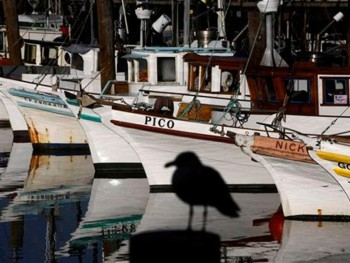 North Coast fishermen may have plenty of free time on their hands this summer if regulators adopt any of three proposed alternatives for this year’s commercial salmon seasons. With the outlook suggesting diminished abundance of two key Chinook salmon runs, fishery managers have structured a season with lots of gaps, especially in the Fort Bragg region, where the fishery would be all or mostly closed in June and completely shut down in July. North Coast Rep. Jared Huffman, D-San Rafael, and other bay-delta representatives said the proposed cuts would reduce commercial fishing boats’ time on the water by at least 20 percent overall — and by up to 45 percent along a stretch of the North Coast from Point Arena to Horse Mountain, located north of Shelter Cove in Humboldt County. Read the rest here 11:22
North Coast fishermen may have plenty of free time on their hands this summer if regulators adopt any of three proposed alternatives for this year’s commercial salmon seasons. With the outlook suggesting diminished abundance of two key Chinook salmon runs, fishery managers have structured a season with lots of gaps, especially in the Fort Bragg region, where the fishery would be all or mostly closed in June and completely shut down in July. North Coast Rep. Jared Huffman, D-San Rafael, and other bay-delta representatives said the proposed cuts would reduce commercial fishing boats’ time on the water by at least 20 percent overall — and by up to 45 percent along a stretch of the North Coast from Point Arena to Horse Mountain, located north of Shelter Cove in Humboldt County. Read the rest here 11:22
Pacific Fishery Management Council considers closing ocean salmon seasons due to projected poor coho returns
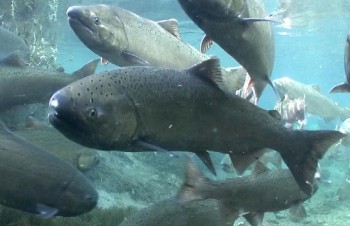 Poor forecasts for returning coho salmon are prompting state and tribal fishery managers to consider closing all salmon fisheries in Washington’s ocean waters this year as part of a federal season-setting process for the West Coast. State, tribal and federal fishery managers have developed three options for non-treaty ocean salmon fisheries that reflect the anticipated low coho returns. Two options would permit some salmon fishing this year, but one would close recreational and commercial ocean fisheries for. Those alternatives were approved Sunday for public review by the Pacific Fishery Management Council (PFMC), which establishes fishing seasons in ocean waters three to 200 miles off the Pacific coast. A public hearing on the three alternatives for ocean salmon fisheries is scheduled for March 28 in Westport. Read the rest here 14:17
Poor forecasts for returning coho salmon are prompting state and tribal fishery managers to consider closing all salmon fisheries in Washington’s ocean waters this year as part of a federal season-setting process for the West Coast. State, tribal and federal fishery managers have developed three options for non-treaty ocean salmon fisheries that reflect the anticipated low coho returns. Two options would permit some salmon fishing this year, but one would close recreational and commercial ocean fisheries for. Those alternatives were approved Sunday for public review by the Pacific Fishery Management Council (PFMC), which establishes fishing seasons in ocean waters three to 200 miles off the Pacific coast. A public hearing on the three alternatives for ocean salmon fisheries is scheduled for March 28 in Westport. Read the rest here 14:17
Pacific Fishery Management Council Meeting in Sacramento, California March 8-14, 2016 Listen Live
 The Pacific Fishery Management Council and its advisory bodies will meet June 10-16, 2015 in Spokane, Washington, at the DoubleTree by Hilton Sacramento. Download the June 2015 Meeting Notice WITH Agenda (includes full logistics for public comment deadlines). Listen to the Live Audio Stream March 9-14. 12:51
The Pacific Fishery Management Council and its advisory bodies will meet June 10-16, 2015 in Spokane, Washington, at the DoubleTree by Hilton Sacramento. Download the June 2015 Meeting Notice WITH Agenda (includes full logistics for public comment deadlines). Listen to the Live Audio Stream March 9-14. 12:51
What’s eating at Dr. Ray Hilborn today?!! Dr. Geoff Shester from Oceana
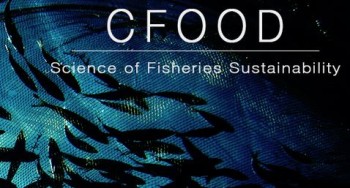 Last week Dr. Geoff Shester, California campaign director for the nonprofit advocacy group Oceana criticized the Pacific Fishery Management Council for the persistence of low numbers of California Sardines. The lack of a population recovery may cause the commercial moratorium to last until 2017. The author explained this sardine population decline as being 93 percent less than it was in 2007. Dr. Shester does not believe this is because of environmental causes like climate change, El Nino, or natural fluctuations in forage fish species however – instead he blames the management body. “They warned of a population collapse and the fishery management body basically turned a blind eye and continued moving forward with business as usual.” Response Comment by Ray Hilborn, University of Washington, Read the rest here 11:49
Last week Dr. Geoff Shester, California campaign director for the nonprofit advocacy group Oceana criticized the Pacific Fishery Management Council for the persistence of low numbers of California Sardines. The lack of a population recovery may cause the commercial moratorium to last until 2017. The author explained this sardine population decline as being 93 percent less than it was in 2007. Dr. Shester does not believe this is because of environmental causes like climate change, El Nino, or natural fluctuations in forage fish species however – instead he blames the management body. “They warned of a population collapse and the fishery management body basically turned a blind eye and continued moving forward with business as usual.” Response Comment by Ray Hilborn, University of Washington, Read the rest here 11:49
Dan Bacher – Sacramento Salmon Ocean Abundance Forecast Is Half Of Last Year’s
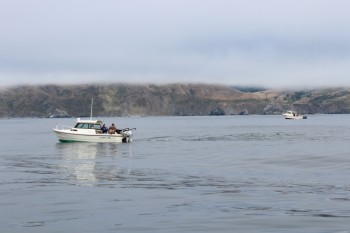 The federal government last week released its data on the projections for the upcoming ocean and river salmon seasons in California and Southern Oregon — and it’s not looking good. Commercial and recreational anglers are bracing for further fishing restrictions this season, based on relatively low abundance estimates for Sacramento River and Klamath River fall-run Chinook salmon, the two drivers of the West Coast fishery. The estimate of Sacramento River salmon that can be found in the ocean in 2016 is less than half of last year’s forecast of 652,000 fish. The Pacific Fishery Management Council (PFMC), a quasi-governmental body that crafts the seasons and regulations for salmon, groundfish and other fisheries,,, Read the rest here 11:01
The federal government last week released its data on the projections for the upcoming ocean and river salmon seasons in California and Southern Oregon — and it’s not looking good. Commercial and recreational anglers are bracing for further fishing restrictions this season, based on relatively low abundance estimates for Sacramento River and Klamath River fall-run Chinook salmon, the two drivers of the West Coast fishery. The estimate of Sacramento River salmon that can be found in the ocean in 2016 is less than half of last year’s forecast of 652,000 fish. The Pacific Fishery Management Council (PFMC), a quasi-governmental body that crafts the seasons and regulations for salmon, groundfish and other fisheries,,, Read the rest here 11:01
West Coast sardine populations, long sinking, look even worse in forecast
 Sardines off the West Coast have continued on a steep decline, with populations this summer forecast to be down 93 percent from a 2007 peak, according to a draft assessment from the National Marine Fisheries Service. The sardines are a key forage food for sea lions, salmon and many other species, as well as a source of income for commercial fishermen. Last year, the sardine implosion was so severe that the Pacific Fishery Management Council voted to call off the season that was scheduled to start in July for West Coast fleets, including those in Washington state. Oceana shrew Geoff Shester throws his dogma into the conversation. Read the rest here 13:33
Sardines off the West Coast have continued on a steep decline, with populations this summer forecast to be down 93 percent from a 2007 peak, according to a draft assessment from the National Marine Fisheries Service. The sardines are a key forage food for sea lions, salmon and many other species, as well as a source of income for commercial fishermen. Last year, the sardine implosion was so severe that the Pacific Fishery Management Council voted to call off the season that was scheduled to start in July for West Coast fleets, including those in Washington state. Oceana shrew Geoff Shester throws his dogma into the conversation. Read the rest here 13:33
Pacific Seafood Group sues National Marine Fisheries Service – calling fishery quota restrictions illegal
California-based groundfish catcher and processor Pacific Seafood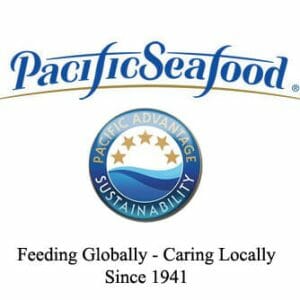 has sued the US government seeking to overturn what they say are “illegal” regulations that threaten the company’s future. A company subsidiary, Pacific Choice Seafoods, which operates a processing plant as well as vessels that fish the Pacific Coast groundfish limited-entry trawl fishery, filed suit on Dec. 4 in a northern California federal court against the National Marine Fisheries Service (NMFS) and its ultimate overseer, US commerce secretary Penny Pritzker. Read the article here 13:50
has sued the US government seeking to overturn what they say are “illegal” regulations that threaten the company’s future. A company subsidiary, Pacific Choice Seafoods, which operates a processing plant as well as vessels that fish the Pacific Coast groundfish limited-entry trawl fishery, filed suit on Dec. 4 in a northern California federal court against the National Marine Fisheries Service (NMFS) and its ultimate overseer, US commerce secretary Penny Pritzker. Read the article here 13:50








